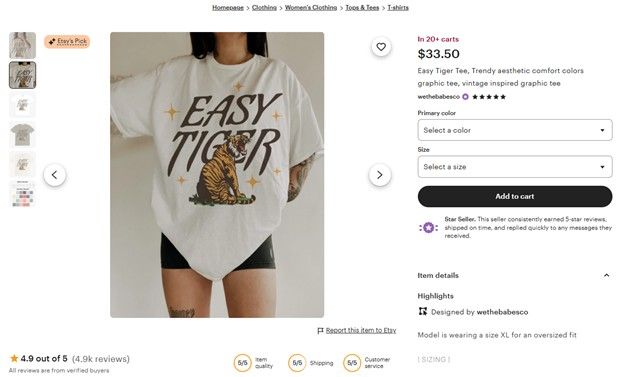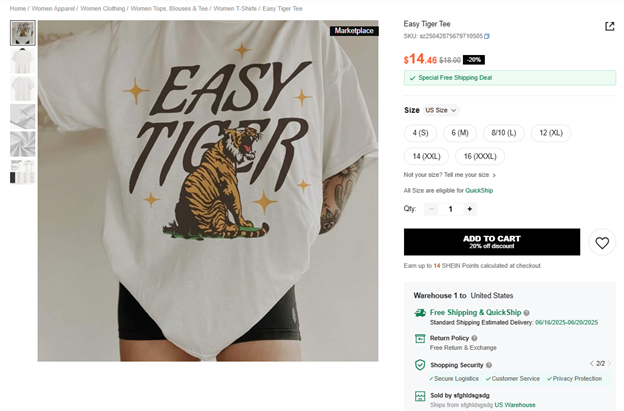
How Policymakers Can Stop Chinese Copycat Commerce
In global e-commerce, Etsy stands out for its mission to empower independent artisans to sell creative products in a marketplace where competition is based on originality and authenticity. But that model is under threat from the Chinese e-commerce ecosystem, where vendors mass-produce identical replicas or dupes that copy original designs without permission and undercut costs. This is not a series of isolated intellectual property (IP) disputes. Instead, it is a trade and IP policy issue that merits regulatory intervention.
Consider a recently trending product on Etsy: a t-shirt with an “Easy Tiger” graphic that was listed in 2024 and received an “Etsy’s Pick” designation, which Etsy awards to highlight quality, reliable, and stylish products. The t-shirt (shown in Figure 1) currently sells for $33.50, and the U.S.-based, women-owned design company behind the product, WE THE BABES, advertises hand-printed and made-to-order graphics.
Unfortunately for WE THE BABES, consumers can purchase an identical copy (shown in Figure 2) of the same t-shirt on SHEIN, which is currently listed for $14.46, and made only one small alteration by cropping the original Etsy listing’s photo. The business behind the copy, sfghldsgsdg, has no contact information or brand presence. sfghldsgsdg’s SHEIN storefront has over 3,000 listings, including not only identical copies of original designs but also dupes, such as one that barely changed a design from the original on Etsy while undercutting the price.


While large brands like H&M, Puma, and Levi Strauss have sued SHEIN for IP infringement, copyright lawsuits are generally too costly for individual designers and require prior copyright registration. If pursued, they tend to result in settlements and do not stop the problem.
Andrea Sager, a lawyer who has helped small businesses file letters of complaint against the Chinese e-commerce platform Temu, has said, “99% of the time, we’re not going to make any money by pursuing these people for infringement. The goal is to just get them removed.” Outside of litigation, independent creators are left with two options: public shaming on social media and takedown notices under the Digital Millennium Copyright Act (DMCA). In the meantime, infringers profit from their IP.
Etsy attempted to strengthen its internal guardrails to support original creators in July 2024 by requiring that “all items must incorporate a human touch,” citing a need to “combat non-compliant listings.”
But Etsy’s guidance cannot stop other platforms from poaching its creators’ works, nor can platform governance address the larger erosion of widely accepted IP norms in global e-commerce. And artificial intelligence (AI) is accelerating this problem since bad actors can use generative AI design tools to replicate original works faster than before.
Indeed, some vendors and platforms profit from this erosion. Vendors like sfghldsgsdg who copy and resell creative designs operate in a structure designed for evasion. In addition to sfghldsgsdg’s strategy of anonymity, other vendors hide behind shell companies or register under fake identities. Once flagged or removed, they may reappear under new seller accounts. This rinse-and-repeat model thrives in the absence of vendor traceability requirements.
Platforms like Temu and SHEIN enable and benefit from this system. A group of U.S. designers filed a lawsuit against SHEIN in 2023 under the Racketeer Influenced and Corrupt Organizations (RICO) Act, citing “large-scale and systematic intellectual property theft from U.S. designers large and small.” The group also urged Congress to investigate SHEIN.
The U.S.-China Economic and Security Review Commission noted the issue in a 2023 report, but no legislative action has followed. U.S. policymakers should not treat what’s happening on Etsy as a string of isolated incidents, but instead recognize it as an attack upon the American creative economy and respond appropriately.
First, Congress should pass legislation similar to the SMART Copyright Act, which proposed revitalizing the DMCA mandate to develop standard technical measures (STMs) for preventing copyright infringement at scale. Such legislation would create a transparent rulemaking process to require platforms to implement STMs to detect and block IP-infringing content before it goes live. The SMART Act failed in 2023 due to concerns over mandatory content filtering’s negative effects on free speech and creativity. A new effort should focus explicitly on anti-piracy enforcement and ensure it has clearly defined safeguards for free expression.
Second, the U.S. Trade Representative (USTR) and U.S. Customs and Border Protection (CBP) should coordinate trade and customs enforcement tools to address the primary bad actor in this issue: platforms that profit from systemic IP abuse. Platforms like SHEIN and Temu already meet the criteria for inclusion on the Notorious Markets List (NML), which highlights online markets that reportedly “turn a blind eye to, or benefit from substantial piracy or counterfeiting.” Yet the 2024 NML only included Chinese platforms that operate domestically. Moreover, the NML is primarily a name-and-shame tool with a goal “to motivate appropriate action.”
If future USTR work increases scrutiny on IP infringement of individual designers on online platforms, CBP can supply appropriate action by prioritizing enforcement against shipments associated with flagged platforms named in the NML. And if new legislation requires platforms to implement STMs to identify and flag infringing listings at the point of upload, CBP could work with platforms to use information like seller IDs and import patterns to more effectively screen shipments linked to likely infringers. In this way, STMs would not only help platforms prevent infringement but also create a feedback loop that empowers customs enforcement.
To protect American creativity in the digital age, Congress and trade enforcement regulators should act together to keep creative commerce fair and competitive. Without stronger protection, platforms like Etsy—and independent creators like WE THE BABES who rely on them—will continue to be mined for innovation and left behind in the profits.
Related
August 20, 2025
How Chinese Online Marketplaces Fuel Counterfeits
October 16, 2025
How To Address Counterfeits From Chinese Online Marketplaces
February 22, 2025

